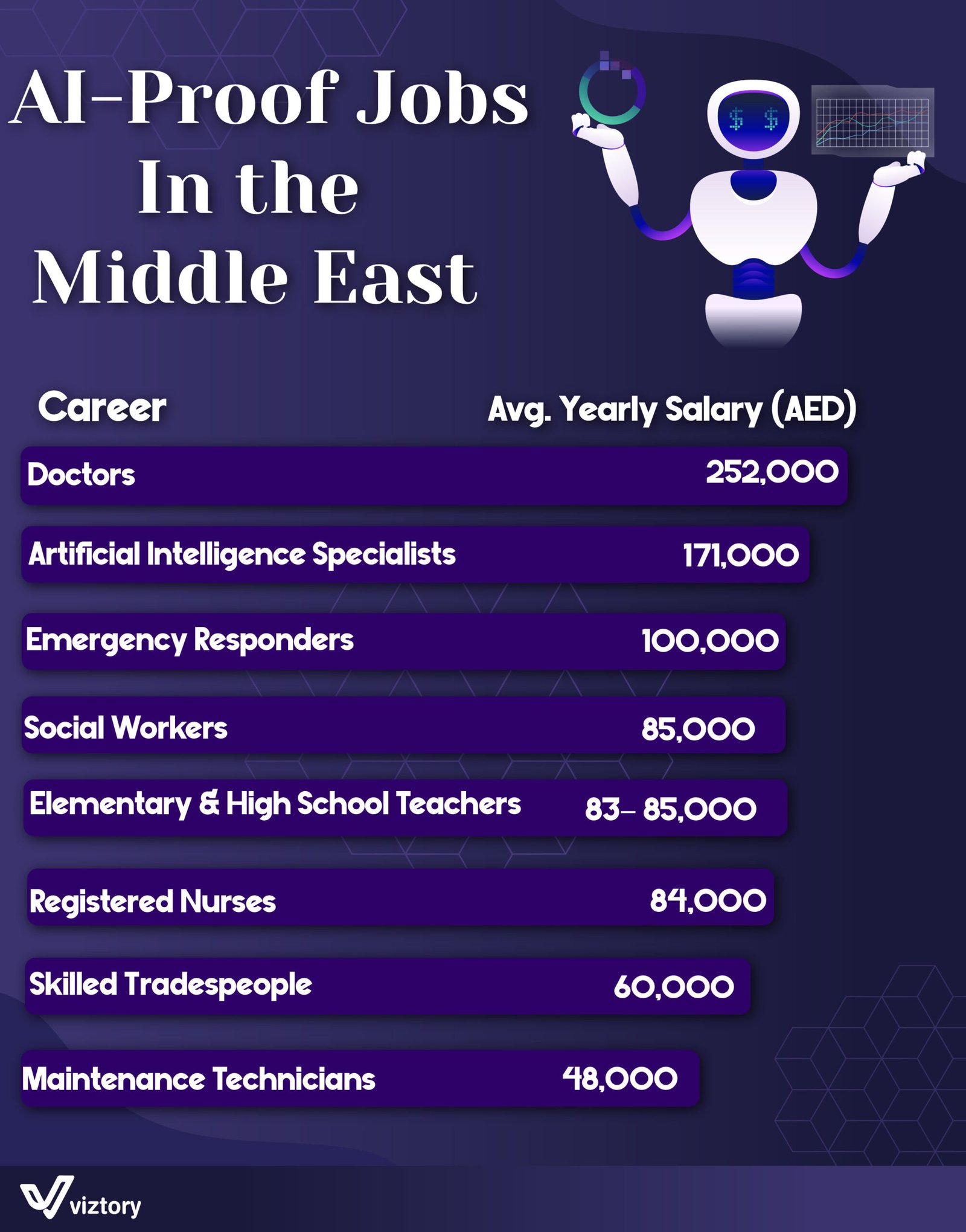AI-Proof Jobs in the Middle East
-
Jan, Tue, 2025
As artificial intelligence continues to revolutionize industries, concerns about job displacement have become widespread. However, some professions remain resistant to automation due to their reliance on human empathy, creativity, and critical thinking. In the Middle East, these “AI-proof” jobs not only provide stability but also offer competitive salaries, as highlighted in the chart.
The Role of Technology in Shaping Careers
The rise of AI and automation has transformed the workforce. While certain jobs, especially those involving repetitive tasks, are at risk of being replaced by machines, others thrive in this new era. Professions that require human interaction, complex problem-solving, and decision-making are more likely to remain indispensable.
AI-Proof Careers in the Middle East
Doctors (252,000 AED/year): Medicine is one of the most secure professions against AI disruption. While AI aids in diagnostics and treatment planning, the empathy and judgment of human doctors are irreplaceable.
Artificial Intelligence Specialists (171,000 AED/year): Ironically, the very field driving automation is among the most secure. Specialists who design, develop, and manage AI systems are in high demand as the region pushes for technological advancements.
Emergency Responders (100,000 AED/year): First responders, including paramedics and firefighters, require quick decision-making and emotional resilience, making their roles irreplaceable by machines.
Social Workers (85,000 AED/year): This field depends heavily on human empathy and understanding, which AI cannot replicate. Social workers address complex social and emotional issues that require personal connections.
Elementary & High School Teachers (83,000–85,000 AED/year): While e-learning platforms are growing, the role of teachers in inspiring, mentoring, and understanding individual student needs ensures their relevance.
Registered Nurses (84,000 AED/year): Nurses combine medical expertise with compassionate care, a unique skill set that technology cannot fully replace.
Skilled Tradespeople (60,000 AED/year): Jobs like electricians, plumbers, and carpenters involve hands-on work and problem-solving in dynamic environments, keeping them safe from automation.
Maintenance Technicians (48,000 AED/year): The upkeep and repair of advanced machinery require human expertise, particularly as technology becomes more complex.
Technology’s Role in Enhancing, Not Replacing
Rather than replacing these professions, AI and other technologies serve as tools to enhance efficiency and effectiveness. For example:
- AI aids doctors by providing faster and more accurate diagnostics.
- Teachers use e-learning platforms to complement their lessons and reach a broader audience.
- Maintenance technicians utilize advanced sensors and diagnostics to streamline their work.
The Middle Eastern Perspective
In the Middle East, investments in AI and technology are transforming industries. Governments and businesses emphasize education and training to equip workers with skills that complement AI advancements, ensuring economic growth while safeguarding livelihoods.
Conclusion
AI-proof jobs in the Middle East demonstrate that while technology may change how we work, it cannot replace the human element in many professions. By embracing AI as a tool rather than a threat, these roles ensure stability, innovation, and the continued growth of the region’s workforce.

